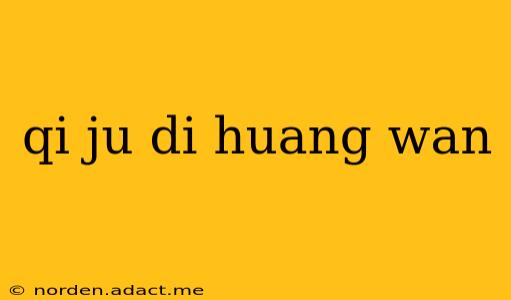Qi Ju Di Huang Wan (杞菊地黄丸), often translated as Lycium-Chrysanthemum-Rehmannia Pill, is a renowned traditional Chinese medicine (TCM) formula used for centuries to address issues related to liver and kidney yin deficiency. This comprehensive guide delves into its composition, benefits, potential side effects, and much more. Understanding this intricate formula requires looking beyond its simple name and exploring its nuanced effects on the body.
What is Qi Ju Di Huang Wan Used For?
Qi Ju Di Huang Wan is primarily prescribed to nourish the liver and kidney yin, two vital aspects of energy in TCM. Yin deficiency can manifest in various symptoms, including:
- Dry eyes and blurred vision: This is a classic symptom, often associated with the liver's role in nourishing the eyes.
- Vertigo and dizziness: Imbalances in liver and kidney yin can lead to instability and dizziness.
- Tinnitus (ringing in the ears): Another common symptom linked to yin deficiency and its effect on the ears.
- Constipation: Yin deficiency can impact the digestive system, leading to dryness and constipation.
- Hot flashes: Particularly in women experiencing menopausal symptoms, yin deficiency can manifest as hot flashes.
- General fatigue and weakness: A lack of yin energy can lead to overall fatigue and a diminished sense of vitality.
What are the Ingredients in Qi Ju Di Huang Wan?
This powerful formula is composed of several key herbs, each playing a specific role in restoring balance:
- Shu Di Huang (熟地黄 - processed rehmannia root): This is the foundational herb, known for its ability to nourish the kidneys and blood.
- Shan Zhu Yu (山茱萸 - cornus fruit): Assists in nourishing the kidneys and strengthening the essence.
- Shan Yao (山药 - yam): Supports the spleen and kidneys, improving energy and vitality.
- Gou Qi Zi (枸杞子 - goji berry): Nourishes the liver and kidneys, improving vision and promoting overall well-being.
- Fu Ling (茯苓 - poria cocos): Helps to regulate fluid balance and alleviate dampness.
- Mu Dan Pi (牡丹皮 - peony bark): Helps to cool the blood and reduce heat.
- Ze Xie (泽泻 - alisma): Assists in the drainage of dampness.
- Ju Hua (菊花 - chrysanthemum flower): Clears heat from the liver and improves vision.
The synergistic action of these herbs is what makes Qi Ju Di Huang Wan so effective in addressing yin deficiency.
Who Should Take Qi Ju Di Huang Wan?
This formula is generally considered safe for individuals with liver and kidney yin deficiency symptoms, but it's crucial to consult a qualified TCM practitioner before starting any course. They can assess your individual constitution and determine if this formula is appropriate for you. Self-medication is strongly discouraged.
Who Should NOT Take Qi Ju Di Huang Wan?
While generally safe, Qi Ju Di Huang Wan is not suitable for everyone. Individuals with:
- Cold or damp constitution: This formula's warming properties may exacerbate these conditions.
- External pathogen infections: It's not recommended during acute illnesses.
- Pregnancy and breastfeeding: Consult a healthcare professional before use.
What are the Potential Side Effects of Qi Ju Di Huang Wan?
Generally, side effects are rare when used correctly and under professional guidance. However, potential side effects can include mild digestive upset. Always consult a TCM practitioner if you experience any adverse reactions.
Does Qi Ju Di Huang Wan Interact with Other Medications?
It's important to inform your doctor or TCM practitioner about all medications and supplements you are taking, including prescription drugs, over-the-counter medications, and other herbal remedies. Potential interactions might exist, and your practitioner can help assess any potential risks.
How Do I Take Qi Ju Di Huang Wan?
Dosage and duration of treatment are determined by a qualified practitioner based on individual needs and assessment. Never attempt to self-treat.
Where Can I Buy Qi Ju Di Huang Wan?
Qi Ju Di Huang Wan can be purchased from reputable TCM practitioners or licensed herbal medicine stores. Always ensure you buy from a reliable source to guarantee quality and authenticity. Avoid purchasing from unknown or unreliable sources online.
Disclaimer: This information is for educational purposes only and does not constitute medical advice. Always consult with a qualified healthcare professional before starting any new treatment or medication, including traditional Chinese medicine. This is not a substitute for professional medical care.
